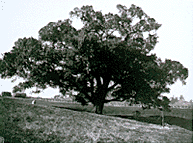The Logan Elm
Logan, chief of the Mingoes

The Logan Elm


The Logan Elm

Logan Elm State Memorial along Highway 23 in central Ohio, is said to be the site where, in 1774, Chief Logan of the Mingo tribe delivered his eloquent speech on Indian-white relations. The speech was supposedly delivered under a large elm tree. Considered to be one of the largest elms in the U. S., the tree stood 65 feet tall, with a trunk circumference of 24 feet and foliage spread of 180 feet. It died in 1964 from damage by blight and storms.
Logan, born along the Susquehanna River in Pennsylvania, was the son of an Indian chief, and also a Christian. He had moved from Pennsylvania to Ohio and had taken up his home with a small tribe of Mingoes, near Steubenville. They soon made him their chief.
One day a party of Indians was camping at the mouth of Yellow Creek. Some white men were camping on the other side of the Ohio River. The Indians, consisting of five men, a woman and a babe, crossed over to the white camp. The whites gave them rum and when they had made them drunk, they killed them. The Indians on the other side of the stream, hearing the shooting, started over to see what was the matter. These were also shot. Among the killed were Logan's relatives: his father, brother, and sister.
Logan at once turned into a savage avenger. Blood was now to be shed for blood. He went on the war path and during the summer he himself took thirty scalps. The Indians in Ohio followed his example and soon no white man was safe. The Shawnees living on the Scioto, near Circleville, were the leaders in the uprising under their great chief, Cornstalk. Logan thought a man by the name of Cresap had killed his family, and once he wrote him a letter in which he said: "What did you kill my people on Yellow Creek for? I thought I must kill, too, and I have been three times to war since. But the Indians are not angry. Only myself. Captain John Logan."
The war did not last very long, for the white people in Virginia raised two armies to go against the Indians. A terrible battle was fought where Point Pleasant, on the Ohio River, now stands, October, 1774, and the red men were thoroughly defeated, and hastened back to their homes on the Scioto to sue for peace.
When Logan was found later under the elm tree, in broken English he burst out in one of the most beautiful speeches ever uttered:
"I appeal to any white man to say if ever he entered Logan's cabin hungry and he gave him not meat; if ever he came cold and naked and he clothed him not. During the course of the last long and bloody war, Logan remained idle in his cabin, an advocate of peace. Such was my love for the whites that my countrymen pointed at me as they passed and said, "Logan is the friend of white men." I had even thought to have lived with you, but for the injuries of one man, who the last spring in cold blood and unprovoked, murdered all the relatives of Logan, not even sparing my women and children. There runs not a drop of my blood in the veins of any living creature. This called on me for revenge. I have sought it, I have killed many. I have fully glutted my vengeance. For my country I rejoice at the beams of peace. But do not harbor a thought that mine is the joy of fear. Logan never felt fear. He will not turn on his heel to save his life. Who is there to mourn for Logan? Not one."
The remainder of the life of Logan was sad. His friends were all dead. His tribe was broken up. His hunting ground had gone to make corn fields for the white man. He wandered about from tribe to tribe, dejected and broken-hearted, a solitary and lonely man. He took to drink and partially lost his mind.
In the dusk of the evening he sat before his camp fire, at the foot of a tree, with a blanket over his head, his elbows resting on his knees, and his head resting on his hands, thinking, no doubt, of his checkered life. An Indian who had been offended at something Logan had said at a council stole up behind him and sank a tomahawk into his brain.
Send comments, suggestions or inquiries:
Overland Trail
Created and maintained by Elizabeth Larson
Copyright © 1996-2001